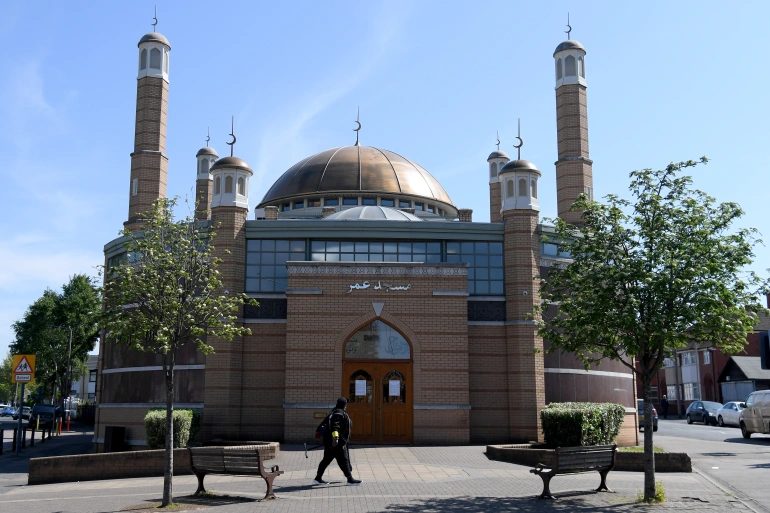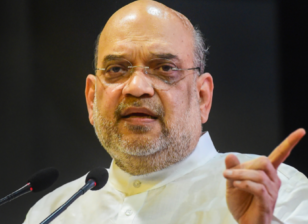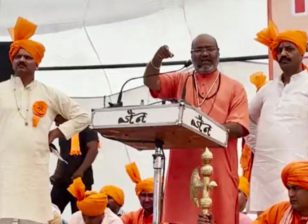Hindu nationalists now pose a global problem
The recent UK violence should serve as a wake-up call. Hindu nationalism is no longer a worry just in India.
India’s Hindu right wing has long advocated for its vision across the world. Overseas offshoots of Prime Minister Narendra Modi’s ruling Bharatiya Janata Party (BJP) have helped in this, as have allied groups like the Vishwa Hindu Parishad or World Hindu Council.
Now, recent events in Leicester in the United Kingdom suggest that their dream of propagating Hindutva, their political philosophy, is coming true in new ways – violently, on the streets of cities far from India.
On September 17, young Hindu men marched through the streets of Leicester, chanting “Jai Sri Ram” – now a Hindu nationalist war cry – and attacking Muslims. This is the muscular brand of Hindu pride and chauvinism that Hindu nationalists have always aspired to.
These tensions have been in the offing. In May, a Muslim teenager in Leicester had to be hospitalised after an unprovoked attack by a Hindu crowd. In August after India’s win against Pakistan in a cricket match, a Hindu group walked through the streets chanting “Death to Pakistan” before attacking a Sikh man. There were similar reports after a second cricket match between the two countries that India lost. In response, groups of Muslim men have also held protests – in one instance, a man pulled down a flag from outside a Hindu religious centre.
There is, of course, a long history of Hindu nationalist and Conservative Party collaboration in the UK. In the lead-up to the 2016 London mayoral elections, Conservative candidate Zac Goldsmith sent anti-Muslim campaign literature to Hindus and Sikhs to bring down his Muslim opponent, Sadiq Khan, of the Labour Party. On the eve of the 2019 UK general elections, there were reports that Hindu nationalist groups in the country were actively campaigning for Conservative candidates, since Labour’s then-leader, Jeremy Corbyn, had criticised the Modi government’s 2019 crackdown in Indian-administered Kashmir. Many of these groups have direct links to the BJP and their actions represented attempts at influencing an overseas election.
However, this is not just a UK problem. The scourge of Hindu nationalism has gone global.
‘True friend in the White House’
Like in the UK, Hindu nationalists have actively campaigned for right-wing, Islamophobic candidates in the United States. This was apparent during the 2016 presidential elections when Hindu groups went all out in their efforts to mobilise Hindu Americans for Republican candidates.
In 2015 an Indian American lobby, the Republican Hindu Coalition (RHC), was launched by Chicago-based businessman Shalabh Kumar, who has had close ties to Modi. Its members donated to former US President Donald Trump’s campaign and the RHC supported him as he ran for the presidency. At an event with the group ahead of the vote, Trump declared: “The Indian and Hindu community will have a true friend in the White House.” He also praised Modi, calling him a “great man,” and released a campaign video wooing Hindu Americans.
Ahead of the 2020 US presidential election, Modi acted almost as a campaigner for Trump, holding two joint rallies with the realtor-turned-politician – one in Ahmedabad, India, and the other in Houston, Texas. In the latter event, Modi seemed to give tacit backing to Trump’s re-election campaign, even uttering the phrase “Ab ki baar, Trump sarkar (This time, it’s going to be a Trump government)”.
However, like in the UK, the Hindu right in the US has now moved from electoral influence to demonstrations of street might. In August this year, bulldozers adorned with posters of Modi and the BJP chief minister of Uttar Pradesh, Yogi Adityanath, appeared at an Indian Independence Day parade in Edison, New Jersey, apparently celebrating the disturbing trend of local governments demolishing the homes of Muslim activists in India. Following criticism, the organiser – the Indian Business Association – apologised for the incident.
Open threats
In Canada too, Hindu nationalists have been making waves. In December last year anti-Sikh slogans and the Hindu swastika appeared outside a Sikh school. Canadian academics have been harassed and faced death and rape threats from diaspora Hindutva supporters for criticising the Modi government in India.
In June, Ron Banerjee, a Canadian Hindu nationalist openly called for the genocide of Muslims and Sikhs. “It is awesome what Modi is doing,” Banerjee said, in an interview to a YouTube channel. “I support the killing of Muslims and Sikhs in the Republic of India because they deserve to die.”
Australia too is witnessing an uptick in hate crimes committed by Hindus against Muslims and Sikhs. One such attacker, Vishal Sood, was eventually arrested for a series of attacks on Sikhs, and was convicted and deported since his visa had expired. When he got back to India, he received a hero’s welcome.
Attempts have also been made by Indian authorities in Australia to silence critics of Modi and his Hindu nationalist policies. Thirteen academic fellows resigned from the Australia India Institute at the University of Melbourne citing interference from the Indian High Commission and attempts to censor research and writing that presented an “unflattering” image of India.
Why has Hindutva gone global?
Undoubtedly, the rise of Hindu nationalism globally has much to do with the rise of Modi.
Since becoming prime minister in 2014, he has overseen a highly controversial citizenship reform that discriminates against Muslim asylum seekers, scrapped the constitutionally guaranteed autonomy of Jammu and Kashmir and built a temple at the location of a historic mosque demolished by Hindu hardliners in 1992. All while going after opposition leaders, activists and critics.
Modi’s success in delivering on Hindutva’s promises at home has inspired his supporters in the diaspora to exude a sense of chauvinistic pride abroad.
However, world leaders are guilty too, of legitimising Modi, giving this subsection of Hindu expatriates the conviction that their bigoted vision has some global cache. From Trump to former British Prime Minister Boris Johnson, and from former Israeli Prime Minister Benjamin Netanyahu to Brazilian President Jair Bolsonaro, multiple right-wing politicians have presented themselves as “friends” of Modi.
Even those Western leaders who do not have a particularly pronounced right-wing agenda have been keen to establish and develop their economic and strategic ties with India while turning a blind eye to the Modi government’s dismal human rights record.
What is next?
Islamophobia now appears to be a matter of public and foreign policy for India. The Indian High Commission in the UK responded to the events in Leicester by specifically referring only to the worries of the Hindu community there.
However, Leicester should serve as a wake-up call: Hindu nationalism cannot be ignored any more as a domestic, Indian issue. The movement has gone international – and is taking an increasingly violent form in other countries too. It is now a threat to democratic principles, equality and human rights everywhere. India under Modi will not address it. The world must.
This article originally appeared in Aljazeera




